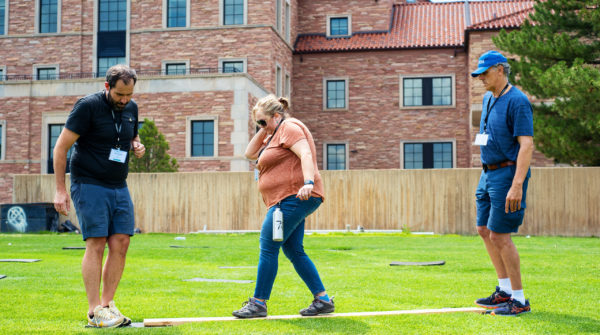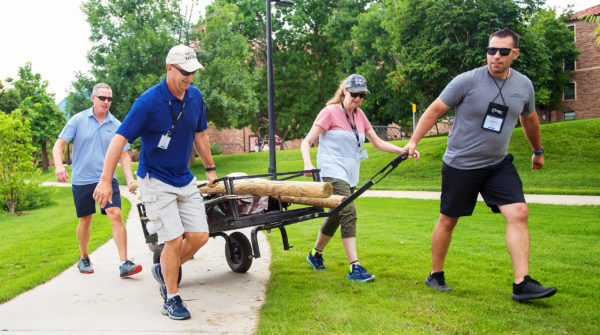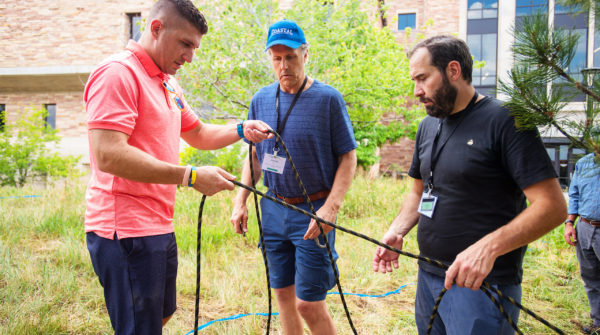Coursework was anything but banking as usual for attendees of the Community Bankers Summit, hosted July 25-27 at the University of Colorado Boulder.
The Graduate School of Banking at Colorado (GSBC) welcomed 50 alumni back to campus for the three-day event. The first two days featured the inaugural Leeds Executive Leadership Symposium, the result of a partnership between GSBC and the CU Boulder Leeds School of Business, which offered GSBC alumni a certification in executive leadership. Leeds, which stands for Leadership, Ethics, Executive Decision making, supported GSBC’s mission of preparing the next generation of community bank leaders by offering programming unlike anything else GSBC has offered before.
Many GSBC alumni now hold significant leadership positions at their organizations. To continue their development, Leeds faculty coupled traditional classroom sessions with outdoor experiential learning to take them out of their typical day-to-day duties, gain new perspectives on their leadership styles and obtain greater clarity on their personal leadership challenges. The focus of this curriculum affirms GSBC’s belief that strong leaders create secure banks, which help build robust communities and local economies.
“The connections made and lessons learned at GSBC’s Executive Leadership Symposium and Community Bankers Summit are essential for community banks to stay relevant and continue to serve the communities that depend on them,” stated GSBC alum and attendee Niki Stotler (’16). “This event is another example of the GSBC’s commitment to excellence and providing continuing education to the alumni of the school.”
Non-alumni were welcomed to campus for the third day of the program which showcased a curriculum of community-banking focused topics curated by GSBC’s Alumni Advisory Board. Topics taught that day were top of mind for community banks and included technology and innovation, the M&A environment and talent management strategies among others.
Due to its success, GSBC has entered a partnership with the Leeds School of Business to continue this program in 2023. The next Community Bankers Summit will be offered July 24-26, 2023. If you’re an alum of GSBC and want to be notified when enrollment for the 2023 program opens, request more information.
Leadership courses led by Leeds School of Business faculty included:
Leader Reactions Course with Aaron Roof (pictured above): This course was derived from military special operations assessment and selection courses. It is designed to place individuals in challenging situations which require leadership skills, decision making, creative problem solving, teamwork and effective communication. Teams moved through different “missions” rotating leadership positions with facilitators providing feedback and adjusting complexity to ensure Summit attendees experienced a safe, fun, challenging and impactful learning experience. [Source: CU Boulder Executive Leadership Program]
Understanding the Organization as a System with Antonio Papuzza: Papuzza challenged listeners to have a systematic approach to problem solving. By getting to the bottom of what is causing a system to fail, attendees learned to allow themselves to view their banks/organizations as an interconnected, holistic system.
Creating an Ethical Climate with Joshua Nunziato: As an expert in ethics and ethical climates, Nunziato reminded our listeners of the economic and moral roles community banks play in their communities; at its core, the moral role of community banks is to “facilitate human flourishing in the places where you live.”
Leading Organizational Change with Doug Bennett: In this conversational session, Bennett challenged listeners to get to the bottom of organizations’ cultures before assuming the best course of action in leading change.
Leading Through a Crisis with Cory Cunningham: It’s a reality that a crisis can happen at any time, on any scale. From data breaches to public scandal, Cunningham gave attendees best practices in handling the bank’s image through different types of crises.






